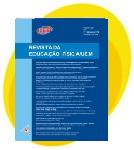<b>Effects of the systematic physical activity on motor performance of preschool children</b> - doi: 10.4025/reveducfis.v23i3.14306
Abstract
The purpose of this study was to assess and compare the motor performance of preschool children engaged and not engaged in systematic physical activity (SPA). Eighty-eight children (52 engaged in and 36 not engaged in SPA), ages 4-6 yr, attending kindergarten classes at five schools in Porto Alegre, RS, participated in the study. A questionnaire was administered to verify the children’s level of physical activity, and the Test of Gross Motor Development – Second Editon (TGMD-2), by Ulrich (2000), was used for the analysis of motor performance in the children. Results evidenced that, although both groups have shown a level of motor performance below average for their age, children engaged in SPA showed better performance in locomotor skills, object control, and the gross motor quotient than children not engaged in SPA.
Downloads
Metrics
• Authors retain the copyright and full publishing rights without restrictions.

This work is licensed under a Creative Commons Attribution 4.0 International License.









_1502.jpg)











